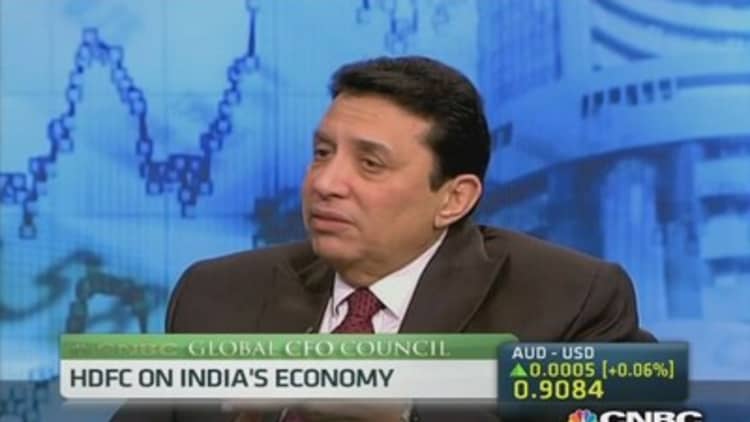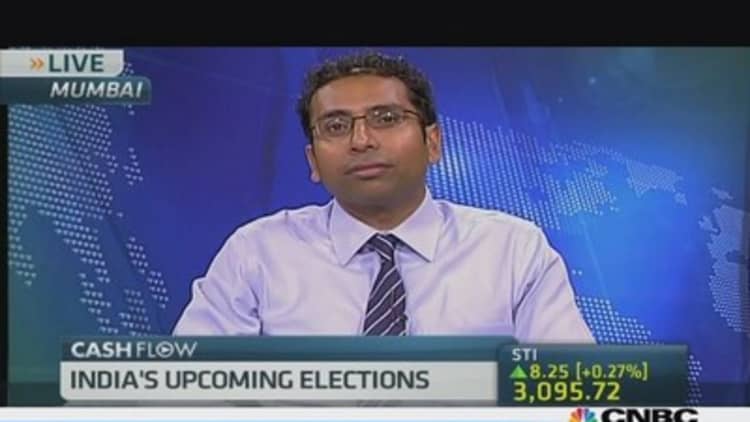Indian shares have rallied to record highs on hopes upcoming elections will spur reforms, but the optimism may be misplaced.
The lead up to elections – and sometimes an aftermath with decisive results – has spurred solid rallies before, Deutsche Bank said in a note.
(Read more: Why a new government may not boost India's reform prospects)
"These rallies have almost inevitably fizzled though as the reality of running a large, complex, and noisy democracy set in," it said. "We just don't think an election can be as big a game-changer as the markets want to believe presently," it added.
Surveys suggest that the ruling Congress Party, led by the prominent Nehru-Gandhi political dynasty since India's independence from Britain, will be unseated by a coalition led by the Bhartiya Janata Party (BJP) in the election, which is expected to start on April 7 and finish on May 12.
Markets clearly have an optimistic view of the election: The Sensex is up more than 4 percent so far this year, running ahead to record highs and bucking declines in many regional peers.
Valuations have also run ahead, with the MSCI India index trading at around 14.3 times 12-month forward earnings, an around 2 percent premium to its long-term average, according to data from Nomura.

The rally is particularly striking as the market was one of the hardest hit last year after the U.S. Federal Reserve first broached its plan to begin tapering its asset purchases, with investors punishing India for not doing more to tackle a wide current-account deficit, address a sluggish economy and implement structural reforms.
(Read more: 'Universal' frustration with pace of India reforms: Hero CEO)
"A lot of the good news is priced in, in terms of the election," said Rob Aspin, head of equity investment strategy at Standard Chartered's wealth management group. "The election results may disappoint as the hard work then begins." He expects shares may become rangebound after the election.
Even those who are optimistic about the market's outlook aren't convinced the rally has staying power.
"History suggests risks of a tactical profit-taking pullback around election time," Nomura said in a note, adding it has an Overweight call on the market. "Investors may wish to enter May with Indian equity weightings Neutralized or with macro-overlay hedges in place."
(Read more: This major lender sees India growth at 8% in 5 years)
Nomura expects a stable political outcome, with expectations for economic reforms and faster decision making, will immediately revive confidence in India's growth story.
Many view the current coalition government as more dysfunctional than usual, as well as lacking in fiscal discipline. But not only are there doubts about how accurate the polls may prove to be, it isn't clear a BJP victory will lead to successful business-friendly reforms.

"We wouldn't rule out the possibility that the elections could prove a catalyst for positive change, but current optimism, in our view, is going too far," Capital Economics said in a note.
"There is reason to think the elections will not mark a complete break from the past," it added, noting that even if the BJP wins, it will still require coalition partners.
(Read more: Indian elections: What to expect)
The current coalition may have presided over the least productive parliament on record, but the BJP may share some of the blame for the lack of progress, Capital Economics said, noting that no BJP-governed state agreed to open its retail sector despite a move to allow foreign investment in the supermarket sector.
Deutsche Bank also expects the hoped-for reforms may be slow in coming.
"No amount of electoral triumph will change civil society's opposition to expansion of mining or fast acquisition of land to proceed with large scale infrastructure development," the bank said. "Similarly, getting the support from local governments, headed by opposition parties in many cases, will remain as challenging after the elections as it has been before."
Correction: This story has been corrected to reflect that India's ruling Congress Party was led by the prominent political dynasty, the Nehru-Gandhi family, since India's independence from Britain in the late 1940s.The family was not related to Mahatma Gandhi.
—By CNBC.Com's Leslie Shaffer; Follow her on Twitter @LeslieShaffer1

